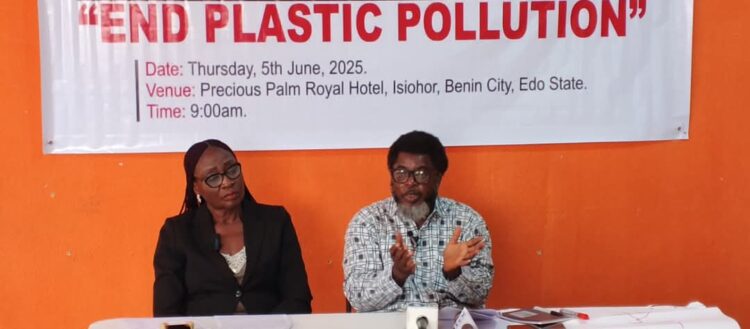The Executive Director, Foundation for Earth Rights Assembly(FERA), Nosa Tokunbor, has advocated for an end to plastic pollution in Nigeria.
He made the advocacy in Benin on Thursday at a press briefing to mark the 2025 World Environment Day.
According to him, “plastics, particularly single-use plastic pollution is visible in all cities of Nigeria due to inefficiency of waste management system. As the global plastics Treaty is under negotiation and countries have agreed to finalise one in this year, 2025, some African nations have been pursuing domestic measures such as product bans, taxes, financial incentives, and packaging controls, with varying degrees of success.”
Going further, he stated that “this year’s World Environment Day will focus on ways to prevent plastic waste from escaping into the environment, such as curbing pollution from single-use plastic products and redesigning plastic products so they last longer.”
Tokunbor averred that “global plastic production has risen exponentially in the last decades. It now amounts to some 400 million tonnes per year. Yet only an estimated 12percent of the plastics produced have been incinerated and only an estimated 9percent have been recycled. The remainder has either been disposed off in landfills or released into the environment where it can take centuries to degrade, including the oceans.
“Plastic is estimated to potentially remain for hundreds to thousands of years once they are deposited in the deep sea where there is no UV light and less turbulence.
“In practical terms, that means reducing our dependence on single –use plastic products. It means redesigning plastic products so that they last longer, are less dangerous and can be reused and ultimately recycled. It means finding alternatives to plastics in a range of products. And it means preventing plastics from seeping into the environment.”
The FERA Executive Director recommended some ways to reduce environmental impacts of plastics which among others include “more ambitious policies are needed including a combination of investments in innovation and interventions aimed at increasing demand for circular solutions while restraining plastics consumption overall; globally more than 120 countries have bans and taxes on single-use plastic items, but most are limited to plastic bags or other small-volume items. This means that these instruments are mainly effective in reducing littering, rather than restraining overall consumption of plastics. A policy roadmap is proposed for countries to reduce the leakage of macroplastics.
Others are “close leakage pathways. Build sanitary waste management infrastructure, organise waste collection and structurally reduce plastics littering by enlarging the scope of anti-littering policies (bans or taxes of frequently littered items) and enhancing implementation of legislation” and “create incentives for recycling and enhance sorting at source. The required measures include extended producer responsibility (EPR) schemes, landfill taxes and incineration taxes, as well as deposit-refund and pay-as-you-throw schemes.”














Discussion about this post